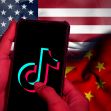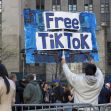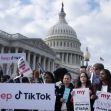The Trump Administration is currently engaged in a legal battle with the short-form video app TikTok. The popular app, which 100 million U.S. residents use, is owned by the Chinese company ByteDance. The order bans TikTok if that company fails to sell to an American based company within 45 days- which sets the deadline for September 20, 2020. The President is basing his ban on his emergency economic powers. If the 45 days expire without the sale of the app, it will become illegal for Americans to enter contracts with ByteDance. The result will be that American companies will not be permitted to pay for advertising on the platform. For users, the app will no longer update and will eventually cease to function.
Similar sanctions have been used to penalize others, for example, Russian oligarchs, by preventing Americans from engaging in business transactions with targeted individuals and entities. According to the Trump Administration, the app presents dangers to the United States because it captures information from users, including Internet search histories and locations. American tech companies, such as Apple, Facebook, and Google, also collect data from their users. However, as TikTok is a Chinese company, Beijing has access to data through the app.
TikTok is now suing the Trump Administration over the executive order, calling it “dangerous” for its limiting effect on free expression and open markets. With a trade war looming and an election fast-approaching, the battle is becoming heated.
What is the Legal Basis for Trump’s Order?
The broad language of the executive order alleges that the app is a hazard to “ the national security, foreign policy, and economy of the United States.” While some have suggested that the order would only prevent advertisers from entering transactions with TikTok, officials in the administration have argued that the ban will also prevent people from downloading the app by claiming that to download TikTok is a form of transaction.
The legal basis for executive orders comes from the United States Constitution, but that document does not explicitly detail how the power works. Instead, Article II implies that such a power exists, and every President has used those powers. Executive orders work as federal laws. However, because only Congress may create laws and appropriate funds, an executive order can only provide direction on how to apply existing laws.
The President must state whether Congress or the Constitution granted his power to enact an executive order. The order may face legal challenges, and federal courts can determine that such orders are not legally valid or that they violate the Constitution.
Even if the law is valid and constitutional, Congress has the power to overturn the order by creating a new law.
The executive order against TikTok claims the International Emergency Economic Powers Act (IEEPA), the National Emergencies Act (NEA), and the United States Code, Title 3, Section 301 as the sources of its authority.
Congress enacted the IEEPA in 1977 and provided the President with economic authority. Many criticize the Act for granting the executive branch too much power. If the President declares an emergency, the law permits the use of executive orders to seize the assets of foreign companies if those assets are in the United States, as well as the power to restrict exports, block financial transactions with foreign entities, impose tariffs, and otherwise economically sanction foreign powers.
The NEA provides the President with the complete authority to declare an emergency. Still, because Congress enacted the law to reign in executive power, it makes it easier for the legislative branch to terminate the order. If the President asserts a national emergency, that President can carry out many acts that would otherwise not be legal. For example, the President may institute martial law, control transportation and communication, seize property, and regulate private enterprises, among other powers.
Finally, 3 USC 301 permits the President to appoint and designate authority to the head of a department within the executive branch.
Using these laws as a basis, the Trump administration claims the power to sanction and effectively ban TikTok.
What is TikTok’s Legal Challenge to the Order?
TikTok filed a complaint in the U.S. District Court for the Central District of California. The lawsuit claims that the administration ignored the company’s evidence, which TikTok presented to the government to show the efforts taken to protect the security of the app’s users. TikTok claims the rapid move to ban the app failed to provide the company due process, that no emergency existed that would have granted the power to enact the order, and that the order violates the First Amendment right to communicate. According to the complaint, the President is using the order to attack China for political purposes.
Is the TikTok Ban Really About Politics?
TikTok is arguing that the Trump Administration is not trying to protect the nation, but rather, is focused on demonizing China as part of his re-election campaign. In support of their assertion, the company points to the President’s comments about COVID-19, which he referred to as the “Kung Flu.”
Some experts doubt that TikTok will win its battle. It is possible, according to one theory, that TikTok is using the litigation to stall the effect of the order, hoping that Joe Biden will win in November and that he will undo the President’s action. However, many believe that Biden would also take a tough stance against the company and China.
A U.S. ban on the app would not be the first as India already took such steps. Australia considered such a move as well, and while they do not intend to ban the app, they advised caution to Australian users.
It appears that Microsoft could soon be purchasing the U.S. operations of TikTok, which would
prevent the app from being banned.






